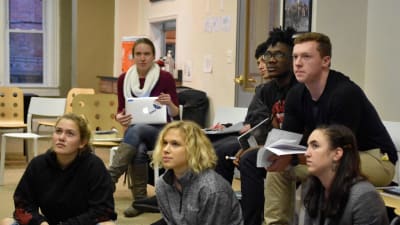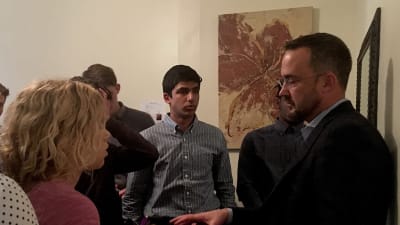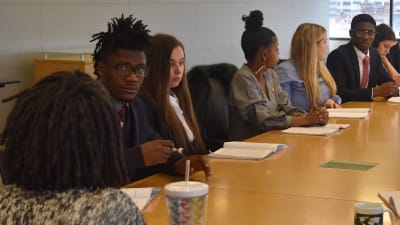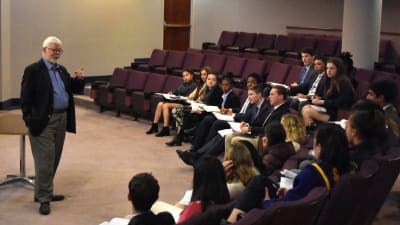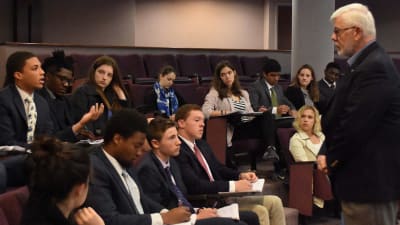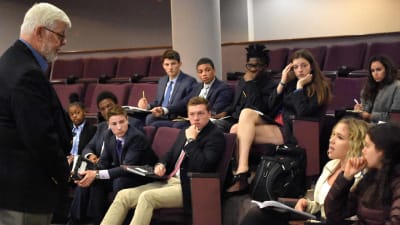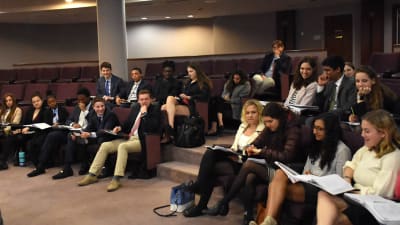Criminal Justice
How absolute are Constitutional rights? Under what circumstances should we limit them, and why? These challenging questions have stayed with our students for much of the semester, during a case study that spanned two months and brought us everywhere from NRA Headquarters (to meet with its former President) to the Supreme Court (where we sat in on an entire oral argument).
We began by asking students to align themselves on a spectrum according to their answer to several provocative questions (“How much do you trust the government?” “Is it better for a guilty person to go free or an innocent person to be imprisoned?”) then split them into rotating discussion groups. (“What do the 5th, 6th, and 8th Amendments say about criminal justice, according to the Supreme Court?” “What does the 2nd Amendment say about gun rights/control, according to the Supreme Court?” “If we say it is worth sacrificing 2nd Amendment rights to prevent mass shootings, is it also worth sacrificing other Constitutional rights–for example our right not to be stopped and searched–to prevent other crimes?” “To what extent does/should race impact criminal justice?”) These sessions pushed students to examine and share their own beliefs and experiences, and helped students flag potential contradictions in their thinking.
Then it was time to visit the Supreme Court and see Constitutional arguments at work. We got up at 5:00am, donned formal attire, and waited for hours in front of the Court. (Of course, just behind us in line was Spring 2010 graduate Audrey Greene, now in law school!) At about 9:00am, we received word that there was room for our entire group, and we were escorted to the courtroom to hear Minnesota Voters Alliance v. Mansky, a First Amendment case involving wearing political messages to polling places. It was a perfect case to hear: not only did it connect with our studies; the issues at play were relatively easy to follow.
Our first visit was to the DC Attorney General’s office, where we met with Elizabeth Wilkins, Chief of Staff and Counsel to Attorney General Karl Racine. Wilkins, an attorney, is also a former law clerk for Merrick Garland and Elena Kagan. She spoke about the District’s criminal justice challenges, the impact of the Heller case (the DC government opposed the decision), and how the Attorney General’s office addresses them, and about her personal story as a woman of color in the law profession.
Our next speaker was longtime SEGL favorite Clark Neily, Vice President for Criminal Justice at the Cato Institute, the country’s leading libertarian think tank. Neily is most famous for representing the plaintiffs in DC v. Heller, the landmark 2008 case that established an individual’s Second Amendment right to bear arms. He spoke about the Heller case and others he is involved in, as well as libertarianism and his take on criminal justice reform. A master of forensics, the students enjoyed (and learned from) trying their hand at countering Neily’s views; the atmosphere was both collegial and engaged.
Several weeks later, we drove to NRA Headquarters in Virginia for a remarkable two-hour session with former NRA President David Keene. Keene spoke passionately (and with occasional humor) aboutthe history of the NRA, the need to limit unreasonable gun control regulations, and the future of the gun rights movement. Afterwards, we were treated to a tour of the National Firearms Museum, which displays thousands of guns used from the Mayflower to 9-11; the visit helped students understand the value millions of Americans place in firearms–and the Second Amendment. It also inspired dozens of thoughtful discussions on the ride home and beyond.
The February 14th Parkland shooting loomed large over this case study, and many students and graduates debated how to take action as a result. A few examples from this semester are below (for graduates in action, scroll to the end of the most recent edition of the SEGL Current).
Lauryn speaks at the March for Our Lives



